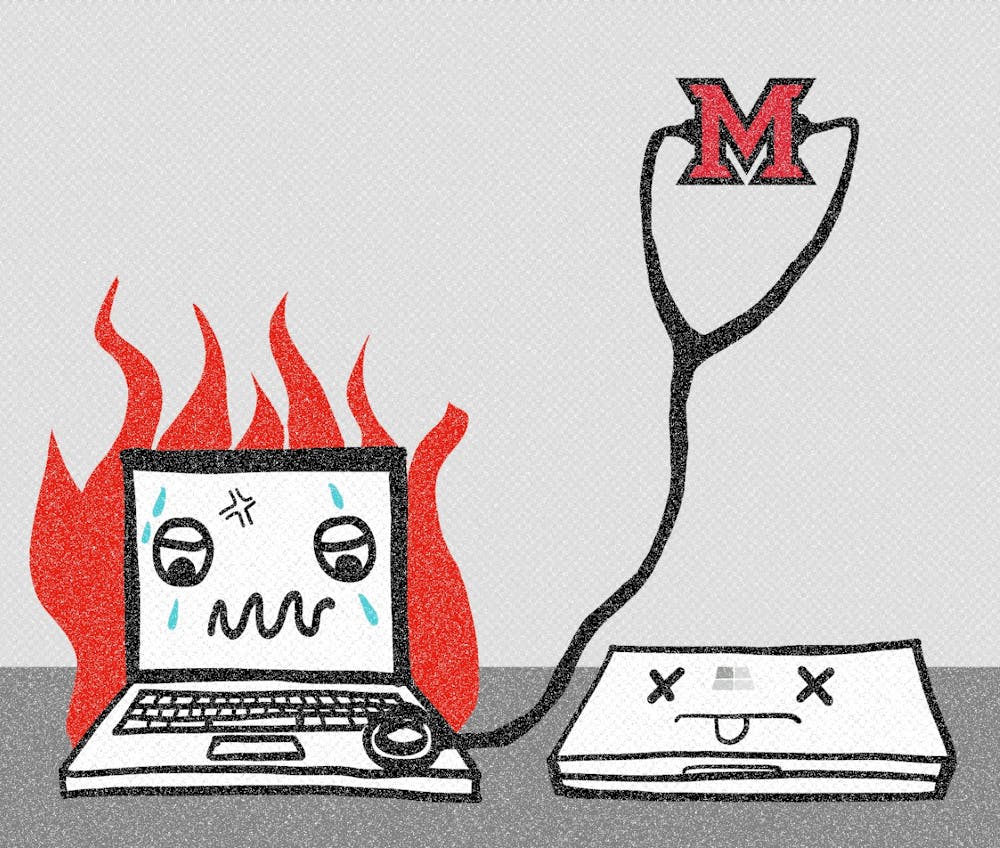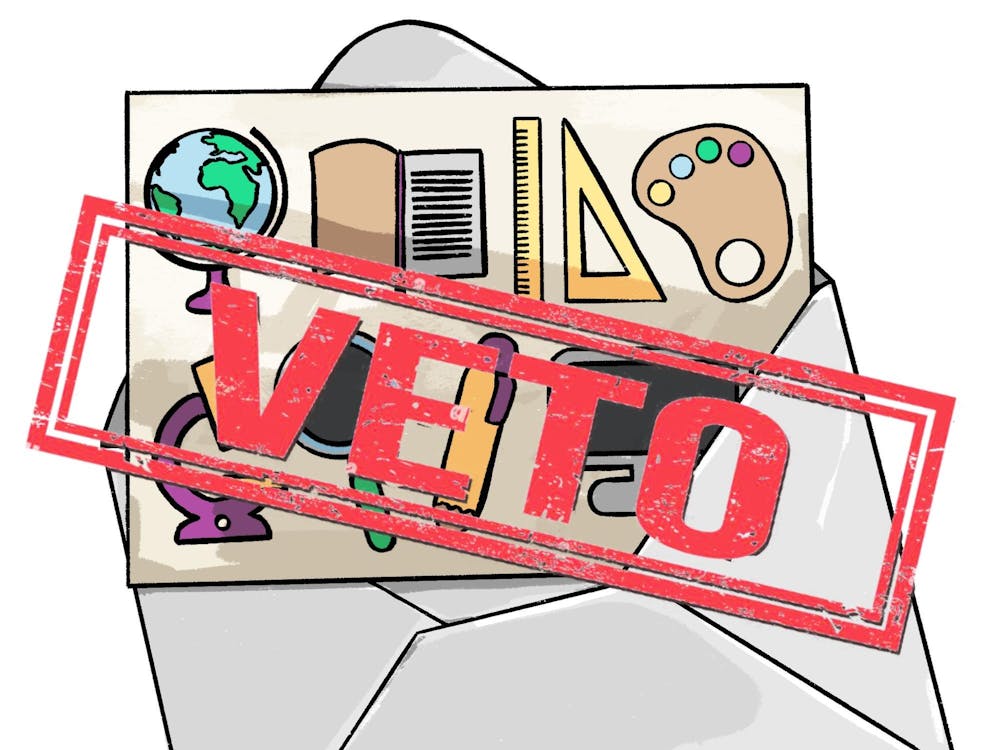Canvas. Zoom. Google Drive.
In 2021, a working laptop is a student’s lifeline to all things college. Everything takes place online, from homework assignments to class registration.
Lyndsey Carter, a sophomore marketing major, only realized her laptop’s importance after it stopped working.
“I can only describe [the feeling] as complete panic because everything that we do at school is primarily on our laptops,” Carter said.
Carter’s laptop broke for the first time a few weeks after moving onto campus her first year. She called the MiTech Campus Store, and they said they could fix her laptop but couldn’t give her a loaner while it was being repaired because she didn’t purchase it through Miami’s Laptop Program for students.
The MiTech Campus Store’s Laptop Program is mainly marketed to incoming students and is an opportunity for them to purchase a laptop with a three-year warranty through Miami and gain access to discounts on repairs as well as loaner laptops.
Kelly Adelman, assistant general manager of technology at the MiTech Campus Store, said they can’t give out loaner laptops to all students because they have a limited supply — 30 Dell laptops and 30 Macbooks. Those in the laptop program pay a $35 fee, included in their laptop purchase, for access to loaners.
“The students are buying into the program to get them those discounts on software services and access to the loaner pool,” Adelman said.
About 1,000 new students signed up for the Laptop Program in both the 2021-2022 and the 2020-2021 school year, a little less than 1,700 in the 2019-2020 school year.
Carter knew about the Laptop Program before her first year but opted to buy a used Macbook for $500 from a store in her hometown, Dayton.
For comparison, the laptops available through Miami’s program are all upward of $1,000.
Because she needed a quick fix and couldn’t get a loaner laptop, Carter decided to go home to get her laptop fixed.
Enjoy what you're reading?
Signup for our newsletter
“I ended up going home the next day and going to the place I bought it,” Carter said. “My dad had to drive down here to pick me up, I went home to get my laptop fixed, and then my mom had to drive down here and bring me back and drive back home, which was kind of inconvenient.”
Last month, Carter’s laptop broke for the second time. It would have cost $500 to get it repaired through Miami, which she could not afford.
“Once again, I had to leave Oxford, go back to Dayton to the place where I bought my laptop, and they actually ended up fixing and solving the issue for only $50,” Carter said.
MiTech can help any students, no matter their laptop model, for free walk-up support, which is any support that doesn’t require checking in their laptop, such as help with installing software. For repairs, however, employees are only certified in repairing Apple and Dell laptops.
“They receive training – the Apple and Dell training to do those hardware repairs – and are authorized to do those repairs for an Apple or Dell warranty,” Adelman said. “So for example, if you have a Lenovo laptop, we aren’t certified, we don’t have the training and we can’t do warranty work under Lenovo’s name.”
Carter was only able to get back to Dayton because a friend who was driving to Columbus offered to drop her off on the way. For students who don’t want or can’t get their computers fixed at Miami, transportation is an issue, particularly for underclassmen who don’t have cars.
The nearest Apple Store is in Cincinnati, and the nearest Best Buy is in Hamilton. As for laptop repair in Oxford, The Computer People and PC Repair and Upgrade are local businesses but are also out of the way of campus and are run out of houses.
“I feel really lucky that I only live an hour away, and that I had the ability to go home and get it fixed on my own, but I also just had really good luck,” Carter said. “If that were to happen to me and I lived five hours away … I couldn’t imagine spending $500 at Miami to get it fixed.”
One resource Carter was initially unaware of was King Library’s laptops for check out. Nick Kneer, strategic communications coordinator for King, said the library has 10 Macbooks and 10 Dell laptops available for three hours of in-library use, as well as 60 Chromebooks, which students can check out for five days at a time.
“The libraries have a lot of different items available for checkout, so it’s not just books and journals,” Kneer said. “We also have a lot of equipment and technology, and laptops are a big part of that.”
Carter found out about King’s laptop check-out from a friend who slid up on her Snapchat story about her laptop. She went to King and checked out a Chromebook until her laptop got fixed, but was disappointed with the computer.
“The laptops themselves aren’t horrible, but they’re also not up to par with the amount of time you’re spending on them to do your work at Miami,” Carter said.
Leah Logan, a first year marketing major, used one of King’s chromebooks for the first two months of this semester after her laptop screen shattered the day before classes started. She did not share Carter’s disappointment.
“I actually never really had an issue,” Logan said. “I think that it was a good solution, just because you clearly need to do homework on your laptop, and I’m in a coding class so I had to bring a computer to class … I don’t even know what I would’ve done without that option.”
Kneer said there are a lot of reasons students may want to check out a laptop from the library.
“Whether it’s as simple as you forgot yours at home and you’re on campus … or you can’t afford one or yours is broken – there’s all sorts of reasons why you might need one, so the libraries are looking to fill that gap for students,” Kneer said.
Logan took her laptop to MiTech to get it repaired, and they had to send it away to fix it, which ended up taking about two months. Because Logan also did not go through the Laptop Program, the repair cost her $400.
“It’s kind of stressful sending your computer away and having to pay to get it fixed ... [It broke] the day before I started college classes, which is already stressful. Most of my books for classes were online,” Logan said.
Although it was an overwhelming experience to start college without her own personal computer, Logan was glad to utilize King’s resources. The Chromebooks are only available for five days at a time, so she had to go back and keep renewing her check-out, but she didn’t mind.
“In the moment, it was definitely more stressful, but Miami offered a solution; not having to pay for a loaner computer was something that took a lot of the stress off,” Logan said.
Carter said her experience with a broken laptop showed her that having access to a laptop at all is cause to be thankful.
“I feel so grateful that I have the opportunity to be able to afford a nicer laptop,” Carter said. “I feel like everyone here takes that for granted, because one moment I had a great laptop, the next moment I had nothing.”




